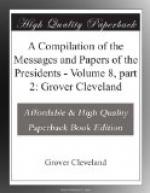Compare our situation and the circumstances of that time with those of the present day, and what, from the very words of Washington then, would be his counsels to his countrymen now? Europe has still her set of primary interests, with which we have little or a remote relation. Our distant and detached situation with reference to Europe remains the same. But we were then the only independent nation of this hemisphere, and we were surrounded by European colonies, with the greater part of which we had no more intercourse than with the inhabitants of another planet. Those colonies have now been transformed into eight independent nations, extending to our very borders, seven of them Republics like ourselves, with whom we have an immensely growing commercial, and must have and have already important political, connections; with reference to whom our situation is neither distant nor detached; whose political principles and systems of government, congenial with our own, must and will have an action and counteraction upon us and ours to which we can not be indifferent if we would.
The rapidity of our growth, and the consequent increase of our strength, has more than realized the anticipations of this admirable political legacy. Thirty years have nearly elapsed since it was written, and in the interval our population, our wealth, our territorial extension, our power—physical and moral—have nearly trebled. Reasoning upon this state of things from the sound and judicious principles of Washington, must we not say that the period which he predicted as then not far off has arrived; that America has a set of primary interests which have none or a remote relation to Europe; that the interference of Europe, therefore, in those concerns should be spontaneously withheld by her upon the same principles that we have never interfered with hers, and that if she should interfere, as she may, by measures which may have a great and dangerous recoil upon ourselves, we might be called in defense of our own altars and firesides to take an attitude which would cause our neutrality to be respected, and choose peace or war, as our interest, guided by justice, should counsel.
The acceptance of this invitation, therefore, far from conflicting with the counsel or the policy of Washington, is directly deducible from and conformable to it. Nor is it less conformable to the views of my immediate predecessor as declared in his annual message to Congress of the 2d December, 1823, to which I have already adverted, and to an important passage of which I invite the attention of the House:




